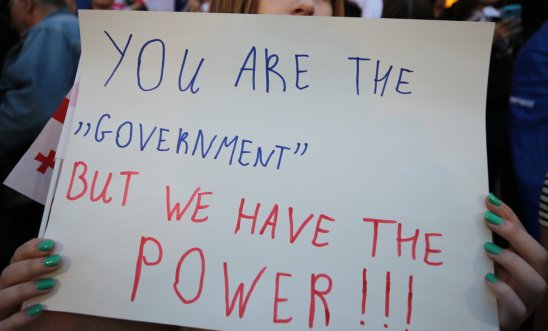
Press releases
Georgia: Government must immediately stop repressive legislation targeting civil society

In response to news that the Georgian parliament made the first steps to approve the contentious bill “On transparency of foreign influence,” which is similar to last year’s widely contested and ultimately withdrawn “foreign agents” bill, Denis Krivosheev, Amnesty International’s Deputy Director in Eastern Europe and Central Asia, said:
“This latest attempt by the Georgian government to push through repressive legislation, while suppressing peaceful protests against it, must end now.
“Georgia’s international partners must not look away from this blatant effort to curb human rights in the country and the cynical attempts to impose overly restrictive legislation that would hinder the ability of people to defend human rights.
“We urgently call on the Georgian authorities to immediately stop their incessant efforts to impose repressive legislation on the country’s vibrant civil society. The proposed legislation poses a direct threat to the rights to freedom of association and expression, and for this reason it must not be adopted.”
Modelling Russia’s infamous foreign agents legislation
Similar legislation, all modelled on Russia’s infamous and highly repressive and stigmatising “foreign agents” legislation, have been considered by countries across the post-Soviet region. The de facto authorities in Georgia’s breakaway region of Abkhazia have also announced plans to vote on a “foreign agents” law as part of their legislative efforts.
On 15 April, the Georgian government’s Legal Committee endorsed the controversial bill “On transparency of foreign influence” - a piece of legislation that compels civil society organisations with foreign funding to register as “organisations carrying out in the interests of a foreign power”.
Protesting the bill
Widespread peaceful protests erupted in Tbilisi with demonstrators waving Georgian and EU flags. The police response escalated quickly, resulting in 14 detentions for alleged public order offences and a reported police injury.
Local civil society organisations have also raised concerns over reports of Government officials threatening public servants and others to prevent them from speaking against the bill.
Critics argue this bill could undermine Georgia’s EU accession ambitions by targeting civil society organisations and independent media, smearing them as “foreign agents” in a way that delegitimises their work, and restricting their parliamentary access.